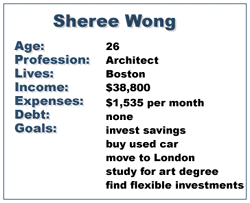|
A moving story
|
 |
July 7, 2000: 10:40 a.m. ET
An artist-architect keeps traveling, switching between career and desire
By Staff Writer Alex Frew McMillan
|
NEW YORK (CNNfn) - Checks & Balances runs weekly on CNNfn.com. People with questions about financial planning are invited to write in explaining their financial picture and short- and long-term goals. See the bottom of this article for specifics. For those selected, financial planners will review the details and suggest ways to meet those goals.
Sheree Wong switches between three roads - her architecture career, her passion for painting and her love of travel. In between she has heard of various alphabetized paths she has yet to walk down, such as the IRA and 401(k).
But the 26-year-old junior architect figures it's time to take some of them. "I know a little bit about the 401(k) through my company and asking friends in the office. But I wanted to know if that would fit my situation, or if that would put a restraint on my situation."
 Wong has lived a very flexible life, and she wants to keep it that way. She was born in Taiwan but grew up in Hong Kong, then moved with her parents to Vancouver, Canada, while she was in high school, and then to Toronto. Wong has lived a very flexible life, and she wants to keep it that way. She was born in Taiwan but grew up in Hong Kong, then moved with her parents to Vancouver, Canada, while she was in high school, and then to Toronto.
She's living and working in Boston at the moment, but she ultimately wants to move to London and get a postgraduate degree in art.
She knows her geographic trajectory has been a little unusual, but it's just life to her. She likes moving. "My parents move a lot themselves, even within Hong Kong. It was the lifestyle I grew up with. I just did the same thing."
Artist-architect, dreamer and designer
She hopes to move east again in about two years, to attend the Royal College of Art. Thanks to her childhood in Hong Kong, she has British citizenship, so she figures she may get a break on the tuition. She would try and find a part-time job while studying, she says.
 The postgrad diploma would hang next to the bachelor's degrees Wong already has from the University of Toronto, where she graduated in art and then in architecture. Her adult life has seen her move back and forth between art and design, her heart and her head. The postgrad diploma would hang next to the bachelor's degrees Wong already has from the University of Toronto, where she graduated in art and then in architecture. Her adult life has seen her move back and forth between art and design, her heart and her head.
"I'm always interested in art," she said. "But at the same time, I wanted to make it more practical. And I was interested in design." So after she graduated with her first degree in 1994, she went down a more practical route, reaching the dais for the architecture degree in 1999.
She interviewed with the firm Rafael Vinoly Architects in New York. But they asked if she'd move to Boston to work on the convention and exhibition center there. She said sure.
"I didn't know anything about Boston when I moved here, so it was quite a challenge," she remembers. But she has settled in now. Which of course has encouraged her to think about moving on.
A debt-free, if not care-free, life
In the meantime she might buy a car, something subcompact and second-hand. She needs it to transport art supplies. But after close to a year in downtown Beantown, she also wants to explore more of Boston's outskirts. She would sell it if and when she moves to England.
 Right now, she doesn't have much beyond $885 in rent and around $650 a month in regular expenses for day-to-day stuff. Right now, she doesn't have much beyond $885 in rent and around $650 a month in regular expenses for day-to-day stuff.
So Wong pays off her credit card every month. The rest of her pay she puts into a savings account, where she has around $4,000.
She wants to know what to do with it. "As a working alien in the United States, what is the best way to invest my savings if I want something more flexible?" she asks.
She worries that a 401(k) isn't flexible enough, because she has to save the money for retirement or pay a penalty to withdraw it early. She also isn't sure what would happen if she leaves the United States for good.
After London, she figures she will either stay in the United Kingdom or move to New York. Then, perhaps five or six years after she completes her Royal College of Art degree, she hopes to buy her own studio space.
That way, she thinks she will be able to combine both her art and her design, and work on her own. She already freelances a little.
"My long-term goal is to have a good savings plan that will provide me a more-stable financial stage to gradually switch to full-time freelance work," she says.
What the planners say:
Sheree Wong may have three main roads. But Jon Duncan, a certified financial planner (CFP) with J. Duncan & Associates in Tacoma, Wash., gives her the old one-two. It's good news, bad news.
"The good news for Ms. Wong is that she has both the financial wherewithal and the mindset to meet her primary objective, namely moving to London to pursue her graduate degree," he writes. "The bad news is that, given her short investment time horizon, there aren't a lot of suitable high-return options available."
Greg Zandlo, a CFP with North East Asset Management in the Minneapolis suburb of Coon Rapids, Minn., concurs that Wong is well-positioned to get to London without taking a financial beating.
Like Duncan, he admires Wong's excess-free lifestyle and financial restraint. "Many times, financial freedom and flexibility comes through simplicity," Zandlo explains.
 Wong seems disciplined and is living within her means, according to Duncan. At the rate she's running, she's able to save around $1,100 a month, Duncan figures. Wong seems disciplined and is living within her means, according to Duncan. At the rate she's running, she's able to save around $1,100 a month, Duncan figures.
If she continues to save, Wong could build up around $28,000 over the next two years, he says, assuming a modest return of 6.5 percent in a short-term bond fund. He highlights the PIMCO Low Duration Fund (PTLAX) - there's an A and a D class available to retail customers, with the A having a front-end charge and the D being no-load -- or the Vanguard Short-Term Bond Index Fund (VBISX).
If her tuition and living costs for two years in London are going to be lower than $28,000, or if she does indeed find a part-time job, she could invest more aggressively, Duncan says.
"In the meantime, however, why risk losing the money she will need in two years by investing more aggressively?" he asks.
A tight timeframe isn't on her side
Wong may find it hard to resist the siren songs of her colleagues talking about making a killing in the stock market. Or she may be lured from her route by reports of tech stocks roaring away. But she is in a different situation from most 26-year-olds, Duncan says.
"She knows that she is going to be making a very big lifestyle change in two years. She does not have the 40-year investment time horizon that her colleagues who are saving for retirement may have." And in investing, time is your friend, Duncan explains. So her tight timeframe leads Duncan to plump for the low-risk, short-term bond fund for her savings now.
 Zandlo also thinks Wong should not tie up her money in more-complex, less-liquid investments. He applies this reasoning to buying a car. Wong wouldn't have it for very long, and she'd have to pay for upkeep, arrange its sale and so on. Zandlo also thinks Wong should not tie up her money in more-complex, less-liquid investments. He applies this reasoning to buying a car. Wong wouldn't have it for very long, and she'd have to pay for upkeep, arrange its sale and so on.
"I don't think this would be a prudent move at this time, expense-wise," Zandlo says. But it's a lifestyle issue, where cost plays off against freedom. If the pains of car ownership don't sway her, "exercise your best judgment," he says.
Zandlo recommends a slightly different option for the savings money, with a slightly lower return than the bond fund. If Wong opts to put her savings in a money-market account with a mutual-fund company, she could have check-writing privileges. She would still likely see a return of 5.50 percent to 6.25 percent per year, Zandlo expects, which is up to double her current savings-account rate. A money-market account is liquid, with decent interest, he says.
She could also set up direct deposit into the money market, which would save her some time. "This helps simplify running around, plus lets your money go to work quicker, thereby earning more money for you," Zandlo points out.
Different roads on the retirement plan
Duncan is with Zandlo in thinking she should put her extra money in a money-market account going forward, though Duncan did recommend the bond fund for the extant savings.
Duncan thinks she should build toward keeping six months' worth of current expenses - or $9,200 - in the account. "This amount can serve the dual purpose of emergency cash reserve as well as post-graduate study savings," he writes.
Once she reaches that threshold, she could put any surplus in the same short-term bond fund as the savings, Duncan says. "Ms. Wong may have to forfeit her bragging rights at the next office party, but she will sleep well knowing that she will be able to achieve her goal of moving to London in two years."
The planners diverge at one point, taking different roads when it comes to the 401(k).
Zandlo says that if Wong is able to set aside some money for her future, she should do so in her 401(k). Most of her extra money should go in the money market account, sure, he says. "But begin providing for retirement nonetheless. Start the process of tax-deferred accumulation and watch your money grow."
Duncan disagrees, given her aim to have her own freelance business. "The best investment she can make right now is in herself. She should put all of her energy and financial resources towards getting the graduate degree she needs. Without it, Ms. Wong has no long-term." She also may not vest for her company's 401(k) match if she is planning to move on, he points out.
She should also look down the path that leads her to London as far as she can, he thinks, in as much detail as possible. "Then, with a clearer understanding of the cost of her objective, Ms. Wong will be in a better position to plan how to achieve it," Duncan says.
* Disclaimer
Got questions about financial planning? Need some advice? CNNfn.com has organized a panel of outside experts to answer your questions. If you want to be considered for the "Checks & Balances" column, where professional planners suggest ways you can manage your money, send us an e-mail at checksandbalances@cnnfn.com. Include information about your age, occupation, income, assets and monthly expenses -- imagine you're providing a full income statement and balance sheet. Also, share with us any short-term and long-term financial goals you may have. And don't forget to leave your phone number. 
|
|
|
|
|
 |

|

